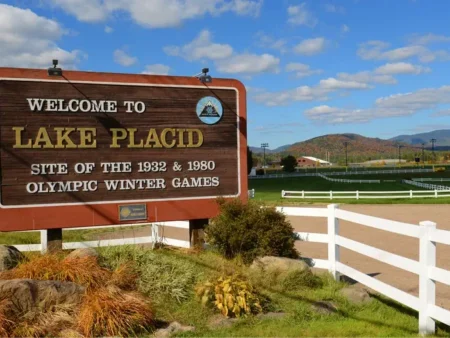Overview of Racetracks in Maryland
Maryland is home to a rich horse racing history that can be traced back to the 18th century. Horse racing has long been a popular pastime for Maryland residents, and the state is famous for hosting some of the most renowned racetracks in the country. With the recent legalization of sports betting, Maryland’s racing industry has experienced renewed interest and growth.
The state’s racetracks have played a significant role in shaping Maryland’s cultural and economic landscape. These tracks have not only provided thrilling entertainment but have also contributed to the local economy through job creation, tourism, and tax revenues. This article will explore the various racetracks in Maryland, their history, the impact of sports betting, and the prospects of the industry.
The Role of Sports Betting in Maryland’s Racing Industry
Maryland sports betting has become an integral part of the racing industry, offering new opportunities for growth and investment. The legalization of sports betting in the state has not only increased revenue for racetracks but has also attracted a new generation of enthusiasts. This has led to the development of new facilities, the introduction of online and mobile betting options, and technological innovations in the industry.
As a Maryland resident, you may be interested in learning about the different racetracks in the state and how you can participate in sports betting. This article will provide an in-depth look at the history, major racetracks, and sports betting options available at these venues, as well as the economic and social impact of the racing industry in Maryland.
History of Horse Racing in Maryland
Early Beginnings
Horse racing in Maryland has a long and storied history that dates back to the colonial era. The first recorded horse race took place in Annapolis in 1743, and by the late 18th century, organized races were being held throughout the state. These early events were often informal gatherings, where locals would race their horses for bragging rights and small prizes.
As the popularity of horse racing grew, so did the need for more formalized racetracks and racing events. In the early 19th century, several racetracks were established in Maryland, and by the mid-1800s, the state was already home to some of the most prestigious racing venues in the country. These early tracks helped lay the foundation for Maryland’s thriving racing industry and established the state’s reputation as a major hub for horse racing in the United States.
The Development of Major Racetracks
Throughout the 19th and 20th centuries, Maryland continued to expand its racing industry with the establishment of new racetracks and the growth of existing ones. Pimlico Race Course, which opened in 1870, became the home of the Preakness Stakes, one of the most prestigious horse races in the country and the second leg of the Triple Crown. The opening of Laurel Park in 1911 added another premier racing venue to Maryland’s roster, further solidifying the state’s position as a leader in the horse racing world.
During this time, Maryland racetracks continued to evolve and adapt to changing demands and interests. The introduction of harness racing at Rosecroft Raceway in 1949, for example, provided an alternative to traditional thoroughbred racing and attracted a new audience to the sport. The development of these major racetracks and their continued success helped to shape Maryland’s racing industry and ensure its longevity.
The Impact of Sports Betting Legislation
The passage of sports betting legislation in Maryland has had a significant impact on the state’s racing industry. Before the legalization, the industry was facing challenges such as dwindling attendance, decreased revenues, and the threat of track closures. The introduction of sports betting has provided a much-needed boost to the industry, bringing in new sources of revenue and attracting a new generation of fans to the racetracks.
The increased interest in sports betting has also led to a resurgence in horse racing in Maryland, with more people attending races and placing bets both at the tracks and through online platforms. This renewed interest in the sport has created a more stable financial future for the industry and has led to investments in new facilities, technological advancements, and additional job opportunities for Maryland residents.
Major Racetracks in Maryland
Pimlico Race Course
Pimlico Race Course is one of the oldest and most storied racetracks in the United States. Located in Baltimore, Maryland, Pimlico has been hosting horse races since 1870 and is best known as the home of the prestigious Preakness Stakes. This historic track has a rich legacy in Maryland’s racing history, and its continued success is essential to the industry’s future.
The Preakness Stakes, held annually in May, is the second leg of the Triple Crown and is one of the most anticipated events in the horse racing calendar. Drawing visitors from all over the country, the Preakness is a major economic driver for the state and a source of pride for Maryland residents. In addition to the Preakness, Pimlico hosts numerous other races throughout the year, providing ample opportunities for sports betting enthusiasts to enjoy the excitement of live racing.
Laurel Park
Laurel Park, located in Laurel, Maryland, is another significant racetrack in the state, having opened its doors in 1911. This historic track has hosted many notable races over the years and is considered one of the premier racing venues in the Mid-Atlantic region. With a full calendar of racing events and a thriving sports betting scene, Laurel Park continues to be a popular destination for both casual fans and avid bettors.
Key racing events at Laurel Park include the Maryland Million Day, which showcases the best Maryland-bred horses, and the Frank J. De Francis Memorial Dash, a prestigious sprint race. The track also offers a variety of on-site betting options, as well as online and mobile platforms, making it easy for Maryland residents to participate in sports betting at their convenience.
Timonium Race Course
Timonium Race Course, located in Timonium, Maryland, is a smaller racetrack with a unique place in the state’s racing history. Established in 1949, the track is situated on the grounds of the Maryland State Fair and offers live thoroughbred racing during the annual fair in late August and early September. While the racing season at Timonium is relatively short, the track provides an exciting and family-friendly atmosphere for Maryland residents to enjoy.
The Maryland State Fair and Racing event is a beloved tradition for many Maryland families, combining the excitement of live horse racing with the fun and entertainment of the fair. Visitors can place bets on the races, enjoy thrilling rides and attractions, and sample delicious fair food. This combination of racing and family entertainment makes Timonium Race Course a unique and cherished part of Maryland’s racing landscape.
Rosecroft Raceway
Rosecroft Raceway, located in Fort Washington, Maryland, offers a different type of horse racing experience for Maryland residents: harness racing. Established in 1949, the track has become a premier venue for harness racing in the Mid-Atlantic region, hosting both live races and simulcast events from other tracks around the country.
Sports betting enthusiasts can find a variety of wagering opportunities at Rosecroft Raceway, with on-site betting available during live racing events and simulcast races. In addition to traditional betting options, bettors can also try their luck with exotic wagers, such as exactas, trifectas, and superfectas, which can yield higher payouts. The unique experience of harness racing, combined with the excitement of sports betting, makes Rosecroft Raceway a popular destination for Maryland’s racing fans.
Sports Betting at Maryland Racetracks
Legalization of Sports Betting in Maryland
The launch of sports betting in Maryland has had a transformative impact on the state’s racing industry. In 2020, Maryland voters approved a ballot measure to legalize sports betting, paving the way for racetracks, casinos, and other designated venues to offer wagering on various sporting events. This development has opened up new revenue streams for Maryland racetracks and has drawn a new generation of fans to the sport.
Since the legalization, racetracks across the state have expanded their sports betting offerings, allowing patrons to bet not only on horse races but also on a wide range of other sporting events. Maryland online sportsbooks go live last November 2022, adding another avenue of betting for MarylandersThis expansion has created new job opportunities, generated additional tax revenue, and fostered investment in the state’s racing infrastructure.
Types of Bets Available at Racetracks
Maryland racetracks offer a variety of betting options for sports enthusiasts, ranging from traditional win, place, and show bets to more exotic wagers. Traditional bets involve picking a horse to win, place (finish first or second), or show (finish first, second, or third). These bets are popular among casual fans and can be a great introduction to sports betting for newcomers.
Exotic wagers, conversely, involve betting on multiple horses in a single race or across multiple races. Examples of exotic bets include exactas, trifectas, and superfectas, which require bettors to predict the exact order of finish for the top two, three, or four horses, respectively. These bets can be more challenging but offer higher potential payouts for successful bettors.
Maryland Mobile Betting Options
In addition to on-site betting at racetracks, Maryland residents can also take advantage of MD mobile sportsbooks. Many racetracks offer online wagering through their websites or mobile apps, allowing bettors to place bets on races from the comfort of their own homes or while on the go. This convenience has made sports betting more accessible to a wider audience and has contributed to the growth of the industry in Maryland.
Mobile betting platforms often provide additional features, such as live streaming of races, handicapping tools, and expert analysis, to help bettors make informed decisions. With the increasing popularity of online and mobile betting, Maryland’s racing industry is well-positioned to continue its growth and success in the coming years.
Impact of Sports Betting on Maryland’s Racing Industry
The introduction of sports betting in Maryland has revitalized the state’s racing industry, providing much-needed revenue and attracting new fans to the sport. Racetracks have been able to invest in new facilities, improve track conditions, and expand their racing calendars, resulting in a more vibrant and competitive racing scene.
Additionally, the popularity of sports betting has spurred innovation in the industry, with racetracks adopting new technologies and offering new wagering options to keep pace with changing consumer preferences. As Maryland’s racing industry continues to evolve and adapt, it is poised to remain a significant part of the state’s cultural and economic landscape for years to come.
Economic and Social Impact of Racetracks and Sports Betting in Maryland
Employment Opportunities
The racing and sports betting industries are significant sources of employment for Maryland residents. Racetracks provide jobs for a wide range of professionals, including trainers, jockeys, stable staff, track maintenance crews, and hospitality workers. The recent expansion of sports betting has created additional job opportunities in areas such as technology, customer service, and compliance.
As the industry continues to grow and adapt to new technologies and market trends, it is likely to generate even more job opportunities in the future. These jobs not only provide a livelihood for many Maryland residents but also contribute to the state’s overall economic health.
Tax Revenue and Economic Growth
Racetracks and sports betting contribute significantly to Maryland’s economy by generating tax revenue and promoting economic growth. The racing industry has long been a vital component of the state’s economy, with racetracks and related businesses contributing millions of dollars in taxes and fees each year. The recent legalization of sports betting has further bolstered this contribution, with new tax revenues from sports wagering helping to fund essential services and programs in the state.
In addition to tax revenues, racetracks and sports betting businesses stimulate economic growth by attracting tourists, supporting local businesses, and spurring investment in the industry. As Maryland’s racing industry continues to thrive, it will remain an important economic driver for the state.
Community Development and Charitable Contributions
Racetracks and sports betting businesses in Maryland also play a role in community development and support various charitable causes. Many racetracks have established charitable foundations or partner with local organizations to give back to the communities in which they operate. These partnerships can take various forms, such as providing financial support for education, health care, and social services, or sponsoring community events and initiatives.
By investing in their communities and supporting local causes, racetracks and sports betting businesses help to improve the quality of life for Maryland residents and contribute to the state’s overall well-being.
Future of Racetracks and Sports Betting in Maryland
Proposed Racetrack Developments
As the racing industry in Maryland continues to grow and evolve, there are several proposed racetrack developments on the horizon. These new projects aim to modernize existing facilities, expand racing opportunities, and attract new fans to the sport. Such developments can create jobs, generate additional tax revenue, and contribute to the overall growth of Maryland’s racing industry.
These proposed projects also signal a renewed commitment to the future of horse racing in Maryland, demonstrating that the industry is well-positioned to thrive in the coming years.
Expansion and Development of Racetracks
To keep up with the growing demand for racing and sports betting, Maryland’s racetracks may need to invest in expansions and improvements to their facilities. This could include the construction of new tracks, the renovation of existing facilities, or the development of new amenities such as restaurants, hotels, and entertainment venues.
By investing in their infrastructure and continually improving the overall experience for patrons, Maryland’s racetracks can maintain their competitive edge and ensure a bright future for the state’s racing industry.
Emerging Technologies and Innovations in Sports Betting
The rapid growth of sports betting and racing in Maryland has been accompanied by a wave of new technologies and innovations that are transforming the industry. From mobile betting apps to advanced data analytics tools, these advancements are making it easier for bettors to engage with the sport and make informed decisions about their wagers.
As technology continues to evolve, it is likely that new innovations will further reshape the sports betting landscape in Maryland, offering new opportunities for growth and engagement for both casual fans and serious bettors.
Challenges and Opportunities for Maryland’s Racing Industry
While the future of Maryland’s racing industry appears bright, there are still challenges and opportunities that lie ahead. Factors such as competition from other forms of gambling, changing consumer preferences, and the need to attract younger fans to the sport will continue to shape the industry’s trajectory. However, with a strong foundation in place, a rich history, and a commitment to innovation and growth, Maryland’s racing industry
Conclusion
In conclusion, Maryland’s rich racing tradition, coupled with the recent expansion of sports betting, has breathed new life into the state’s racetracks. As the industry continues to evolve, embracing technology, engaging the younger generation, and investing in infrastructure will be key to ensuring the long-term success and sustainability of the racing scene in Maryland.
By capitalizing on these opportunities and addressing the challenges that lie ahead, Maryland’s racetracks have the potential to remain a significant part of the state’s cultural and economic landscape, while providing entertainment and enjoyment for racing fans and sports bettors alike.



